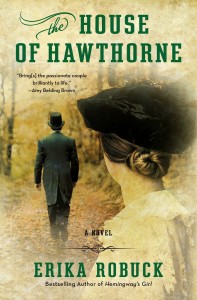Lady of the House: Erika Robuck’s Novel of Sophia Hawthorne
by Karen Howlett
 Erika Robuck’s The House of Hawthorne is a richly coloured portrait of Nathaniel Hawthorne and his family as seen through the eyes of his wife, Sophia Peabody Hawthorne. Spanning the years from the early 1830s, when the young Sophia spent time in Cuba, to the mid 1860s, and following the family from Massachusetts to England and Italy and back home again, this is a first-person narrative which takes the reader deep into Sophia’s world and character.
Erika Robuck’s The House of Hawthorne is a richly coloured portrait of Nathaniel Hawthorne and his family as seen through the eyes of his wife, Sophia Peabody Hawthorne. Spanning the years from the early 1830s, when the young Sophia spent time in Cuba, to the mid 1860s, and following the family from Massachusetts to England and Italy and back home again, this is a first-person narrative which takes the reader deep into Sophia’s world and character.
A passionate woman, intense in her feelings and prone to soulful and effusive expression, Sophia cannot have been an easy person to fashion or temper for the page. I asked Erika what drew her to her narrator:
“Writing the novel from Sophia’s point of view was an immersive experience, and one I had not set out to embody. In the past, I have employed fictional narrators to tell the fascinating historical lives of authors and artists. While researching, I kept my mind open to which fictional character would tell the story of the Hawthornes. After reading many books about the family, I dug into the works and writings of Nathaniel and Sophia directly, and it was in reading Sophia’s 700-page Cuba Journal that she asserted herself. I felt strongly that she wanted to tell their story.
“In all honesty, my initial impressions of Sophia through biographers’ eyes were not entirely favorable. She was portrayed as somewhat of an invalid of ‘convenience’, and criticized for not speaking out against slavery. Through her journals and letters, however, I drew a different view, and felt I understood her better. I became enamored by her enthusiasm, her stubborn optimism, and her almost childlike view of the world. It was a challenge to write in her voice, and I hope I rose to the occasion.”
Nathaniel Hawthorne remarks in the book, “What could be more fictional than biography?” The House of Hawthorne is a novel based on extensive biographical reading and research, but I wondered to what degree Erika used artistic licence to ‘fictionalise’ fact.
“I research heavily with the hopes of presenting as accurate a portrait of my subjects as possible, but I am not a biographer or historian. While they must stick to the ‘facts’, I have the freedom to create conversations and interior reflection they do not. I do believe my research and readings give me insight into the feelings and emotional truths of my subjects.”
Ralph Emerson toasts the house of Hawthorne as “a place warmed by love and the true and perfect union of artists”; Sophia’s artistic gifts – she was a talented painter – were, for the most part, subsumed by family responsibilities and by the moral support she gave her husband, but she seems to have been content in the role of sympathetic non-practising artist. In the end, Erika tells us, she adopted her husband’s medium and published journals and letters, but this seems to have been an unsatisfactory conclusion to a life of artistic promise. How profoundly did Sophia feel herself unfulfilled in this respect, and what would she have made of this telling of her story?
“Upon Nathaniel’s death, Sophia was in crisis. Aside from her pain over losing her soul mate, one of the challenges she faced was a lack of economic stability. She was persuaded to publish their personal papers for money, and also because she genuinely wanted to share her husband’s private genius with the world. Unfortunately, Sophia so heavily edited and censored their marriage journal, the piece was flat and not well received. It was a blow to her because her conscience was already conflicted over publishing it.
“I do believe Sophia would have enjoyed this telling. She was such a gifted artist and inspiring person that she deserves recognition. I hope that the book does honor to her family, their name, and both to the struggles and triumphs of their marriage and creative lives.”
Erika Robuck is the author of Receive Me Falling, Hemingway’s Girl, Call Me Zelda and Fallen Beauty.
About the contributor: Karen Howlett writes at www.cornflowerbooks.co.uk
______________________________________________
Published in Historical Novels Review | Issue 72, May 2015






